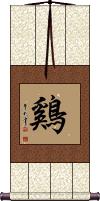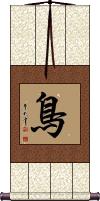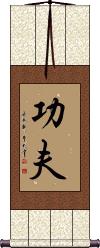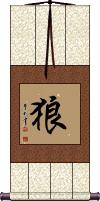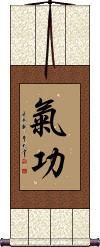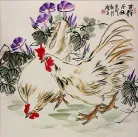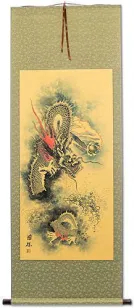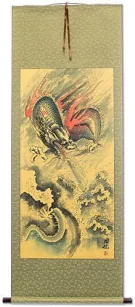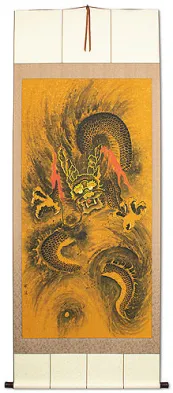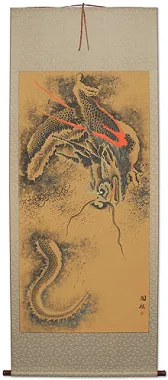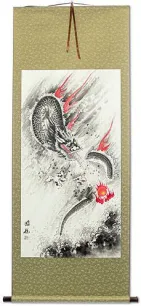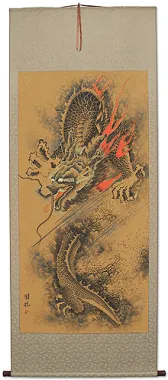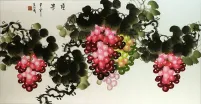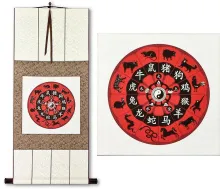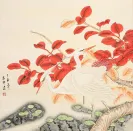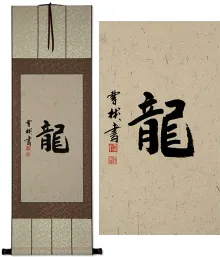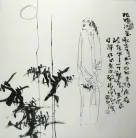Many custom options...
And formats...

Chicken in Chinese...
Buy a Chicken in Chinese calligraphy wall scroll here!
Personalize your custom “Chicken in Chinese” project by clicking the button next to your favorite “Chicken in Chinese” title below...
Rooster / Chicken
Year of the Rooster / Zodiac Sign
鷄 or 雞 is the character for rooster or chicken in Chinese, old Korean, and Japanese.
If you were born in the year of the rooster (chicken), you . . .
Have a unique sense of color.
Are highly principled and responsible.
Have persuasive power.
Are honest.
Have a great ability to communicate.
Please note: There are a few different ways to write rooster/chicken, as shown to the right. If you are particular about the form, please let us know when you place your order.
See also our Chinese Zodiac page.
Bird
鳥 is simply the word for bird in Chinese, Japanese Kanji, and old Korean Hanja.
鳥 can also mean fowl, poultry, cock, or chicken.
Kung Fu / Gong Fu
功夫 or Kung Fu is one of the most famous types of martial arts in the world - and not just because of Bruce Lee.
Some translate the meaning as “Accomplishment by Great Effort.” I think this is partially true, but directly translated, it literally means “Merit/Achievement/Accomplishment Man.” The word “fu” can sometimes mean “husband” or “porter,” but in this case, it can only mean “man.” However, few in China will think “man” when they hear the word “Gong Fu” spoken.
This term is also used for things other than martial arts. In fact, it's used to refer to a person with excellent skills in crafts that require a lot of effort to master, such as cooking, tea ceremonies, and calligraphy.
What a lot of people don't know is that the spelling of “Kung Fu” was actually taken from the old Wade Giles form of Romanization. Using this method, the sounds of the English “G” and “K” were both written as “K” and an apostrophe after the “K” told you it was supposed to sound like a “G.” Nobody in the west knew this rule, so most people pronounce it with a “K-sound.” And so, Gong Fu will always be Kung Fu for most westerners.
Also, just to educate you a little more, the “O” in “Gong” has a sound like the English word “oh.”
The popular Chinese dish “Kung Pao Chicken” suffers from the same problem. It should actually be “Gong Bao Chicken.”
Historical note: Many will claim that Kung Fu was invented by the monks of the Shaolin monastery. This fact is argued in both directions by scholars of Chinese history. Perhaps it is more accurate to say that the Shaolin Monks brought the original fame to Kung Fu many generations ago.
Japanese note: While most Japanese martial artists will recognize these characters, Katakana is more often used to approximate the pronunciation of "Kung Fu" with "カンフー." Some will argue as to whether this should be considered a Japanese word at all.
See Also: Bruce Lee
Wolf
狼 is the character used to represent the elusive animal known as the wolf in both Chinese and Japanese.
If you are a fan of the wolf or the wolf means something special to you, this could make a great addition to your wall.
Do keep in mind, that much like our perception of wolves in the history of western culture, eastern cultures do not have a very positive view of wolves (save the scientific community and animal lovers). The wolf is clearly an animal that is misunderstood or feared the world over.
狼 is seldom used alone in Korean Hanja but is used in a compound word that means utter failure (as in a wolf getting into your chicken pen - or an otherwise ferocious failure). Not a good choice if your audience is Korean.
Qi Gong / Chi Kung
氣功 or Qigong is the title of a technique that is somewhere between medical practice, meditation, and in some cases, religion.
The definition is blurred depending on which school of Qigong you are following. In some cases, it is even incorporated with martial arts.
Some people (even Chinese people) mix this title with Tai Chi (Tai Qi) exercises.
Lately, in China, people will claim to practice Tai Chi rather than Qigong because the Qigong title was recently used as a cover for an illegal pseudo-religious movement in China with the initials F.G. or F.D. (I can not write those names here for fear of our website being banned in China).
You can learn those names and more here: Further info about Qigong
If you are wondering why I wrote “Qi Gong” and “Chi Kung” as the title of this calligraphy entry, I should teach you a little about the various ways in which Chinese can be Romanized. One form writes this as “Chi Kung” or “Chikung” (Taiwan). In the mainland and elsewhere, it is Romanized as “Qi Gong” or “Qigong.” The pronunciation is the same in Taiwan, mainland, and Singapore Mandarin. Neither Romanization is exactly like English. If you want to know how to say this with English rules, it would be something like “Chee Gong” (but the “gong” has a vowel sound like the “O” in “go”).
Romanization is a really confusing topic and has caused many Chinese words to be mispronounced in the west. One example is “Kung Pao Chicken,” which should actually be more like “Gong Bao” with the “O” sounding like “oh” for both characters. Neither the Romanization system in Taiwan nor the Mainland is perfect, in my opinion, and leads to many misunderstandings.
In modern Japan, you may see this written as 気功, but the original 氣功 is still recognized. If you need the Japanese version, please contact me.
This in-stock artwork might be what you are looking for, and ships right away...
Gallery Price: $126.00
Your Price: $69.88
Gallery Price: $240.00
Your Price: $138.88
Gallery Price: $240.00
Your Price: $138.88
Gallery Price: $240.00
Your Price: $148.88
Gallery Price: $240.00
Your Price: $148.88
Gallery Price: $240.00
Your Price: $138.88
Not the results for chicken in chinese that you were looking for?
Below are some entries from our dictionary that may match your chicken in chinese search...
| Characters If shown, 2nd row is Simp. Chinese |
Pronunciation Romanization |
Simple Dictionary Definition |
鳥 鸟 see styles |
niǎo niao3 niao yanadori やなどり |
More info & calligraphy: Bird(1) bird; (2) bird meat (esp. chicken meat); fowl; poultry; (surname) Yanadori A bird. |
酉 see styles |
yǒu you3 yu tori とり |
10th earthly branch: 5-7 p.m., 8th solar month (8th September-7th October), year of the Rooster; ancient Chinese compass point: 270° (west) (1) the Rooster (tenth sign of the Chinese zodiac); the Cock; the Chicken; the Bird; (2) (obsolete) (See 酉の刻) hour of the Rooster (around 6pm, 5-7pm, or 6-8pm); (3) (obsolete) west; (4) (obsolete) eight month of the lunar calendar; (personal name) Yū |
油淋鶏 see styles |
yuurinchii / yurinchi ユーリンチー |
{food} Chinese-style fried chicken topped with chopped scallions and sweet vinegar and soy sauce (chi: yóu lín jī) |
炸子鶏 see styles |
zaazuuchii / zazuchi ザーヅーチー |
(Chinese style) deep-fried chicken (chi: zhaziji) |
心靈雞湯 心灵鸡汤 see styles |
xīn líng jī tāng xin1 ling2 ji1 tang1 hsin ling chi t`ang hsin ling chi tang |
(often used disparagingly) feel-good motivational story or quote (from the Chinese translation of the title of the 1993 self-help bestseller "Chicken Soup for the Soul") |
Variations: |
yodaredori よだれどり |
{food} mouth-watering chicken (Chinese dish of steamed chicken with a spicy sauce) |
The following table may be helpful for those studying Chinese or Japanese...
| Title | Characters | Romaji (Romanized Japanese) | Various forms of Romanized Chinese | |
| Rooster Chicken | 鷄 or 雞 鸡 or 鶏 | niwatori | jī / ji1 / ji | chi |
| Bird | 鳥 鸟 | tori | niǎo / niao3 / niao | |
| Kung Fu Gong Fu | 功夫 | kan fu / ku fu kanfu / kufu | gōng fu / gong1 fu / gong fu / gongfu | kung fu / kungfu |
| Wolf | 狼 | okami | láng / lang2 / lang | |
| Qi Gong Chi Kung | 氣功 气功 | ki kou / kikou / ki ko | qì gōng / qi4 gong1 / qi gong / qigong | ch`i kung / chikung / chi kung |
| In some entries above you will see that characters have different versions above and below a line. In these cases, the characters above the line are Traditional Chinese, while the ones below are Simplified Chinese. | ||||
Successful Chinese Character and Japanese Kanji calligraphy searches within the last few hours...
